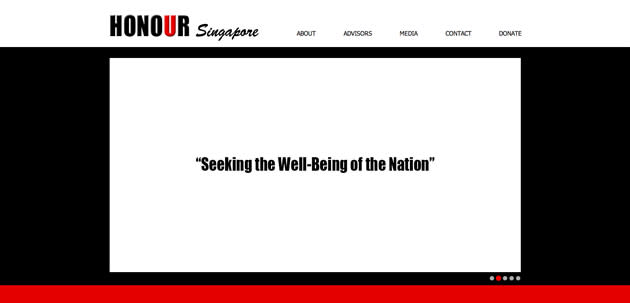Not religious? Honour (Singapore) still has much to prove

Kirsten Han is a Singaporean blogger, journalist and filmmaker. She is also involved in the We Believe in Second Chances campaign for the abolishment of the death penalty. A social media junkie, she tweets at @kixes. The views expressed are her own.
Civil society actors and groups in Singapore are born from need: to draw attention to a particular cause, to educate the public, to change mindsets and/or to advocate for policy reform. They often start small, on limited funds, building up their capacity as they go. Civil society activists usually start as volunteers. Many of them stay that way; only a minority get full-time employment in their NGO. There are very rarely posh parties or the backing of a Cabinet Minister.
Not so for new NGO Honour (Singapore). Its launch party was at the pricey Fullerton Hotel, and even featured a speech from Education Minister Heng Swee Keat. As NGOs and civil society in Singapore go, Honour (Singapore) has had a charmed life from the get-go.
It didn’t take long before Singaporeans – armed with curiosity and Google – decided to probe a little deeper into this new organisation. It was quickly pointed out that Honour (Singapore) had some interesting connections: four out of five of the members on Honour (Singapore)’s board are also on the board of Full Gospel Business (FGB) Singapore. The fifth member of the board is Jason Wong from Focus on the Family, the Singapore branch of a conservative evangelical Christian organisation from the United States.
Honour (Singapore) is also registered to the same address as FGB Singapore.
According to its website, FGB Singapore’s goal is to “penetrate the marketplace” with the knowledge of God and Jesus Christ. Its members, also known as “Gatekeepers”, are described as being “called and chosen to make a difference in the culture of the marketplace they are in so that the gates of hell shall not prevail over them … the real life testimonies of our members provide encouragement to the people in the marketplace to choose to live a Spirit-directed life through Jesus Christ.”
In the context of efforts by religious conservatives to steeplejack or dominate public discourse and civil society (and of the state often giving in to their pressure) – such as in the dramatic AWARE saga of 2009 and more recent efforts such as the protesting of HPB’s FAQ on homosexuality and bisexuality and the banning of books by NLB – some Singaporeans became concerned that Honour (Singapore) would be yet another attempt by conservatives to extend their influence over a secular society.
Honour (Singapore) has responded to criticism, assuring Singaporeans that it is not a religious organisation.
“Honour (Singapore) is not a Christian organisation or a religious group. We have to be judged by what we do. Certainly we must not take any religious stand or do anything at odds with the national objective of supporting racial and religious harmony,” said chairman Lim Siong Guan in response to questions I sent. He added that the organisation would only “engage on invitation”, pointing out that the group is not an advocacy group on government policy, and that it has a panel of community advisors of different backgrounds.
As for using FGB Singapore’s address, Lim said, “Honour (Singapore) has started where it is as it was premises conveniently available to help us get going quickly.”
Lim is right in one thing: Honour (Singapore) will have to be judged by what they do. And reassurances aside, there is still much for it to prove.
In his President’s Message for the 40th anniversary of FGB Singapore published on the group’s website, Khoo Oon Theam (who is also a director of Honour) outlined the “Holy Spirit mandates for 2014 to 2015”.

Screencapped from FGB's website
Screencapped from FGB's website
Under the second mandate – which says “we will go and make apostolic disciples of all nations” – Khoo states, “We will be promoting the Honouring and Peace Culture in conjunction with Singapore's Jubilee. A Foundation, honouring and seeking the welfare of Singapore will be established. … We belief [sic] that obeying the Holy Spirit's mandate to make Apostolic Disciples will fulfil the prophetic scriptures spoken over Singapore…”
Compare this to Lim’s statement on the founding of Honour (Singapore): “So a group of us who have known each other for many years and who all think the same way about wanting Singapore to be a place of peace and stability, decided to set up Honour (Singapore) to promote a culture of honour and honouring as our contribution towards seeking the well-being of Singapore.”
Based on the similarity of wording, it seems highly possible that Honour (Singapore) is the foundation Khoo is referring to. If that is the case, how can Honour (Singapore) remain secular while still serving the mandate of making “apostolic disciples of all nations”?
Honour (Singapore) might claim that it is not a religious group. Yet one wonders how its board members can juggle their two hats. How can the same group of people be committed to the mission of aggressive evangelising and the principle of secularism at the same time? Is it really possible for an organisation highlighted as part of the “Holy Spirit mandates” to be truly secular?
These are questions that Honour (Singapore) will now have to work hard to answer, not just through public reassurances, but through actions. And – for the good of civil society and public discourse – I sincerely hope that Singaporeans will keep watching.


